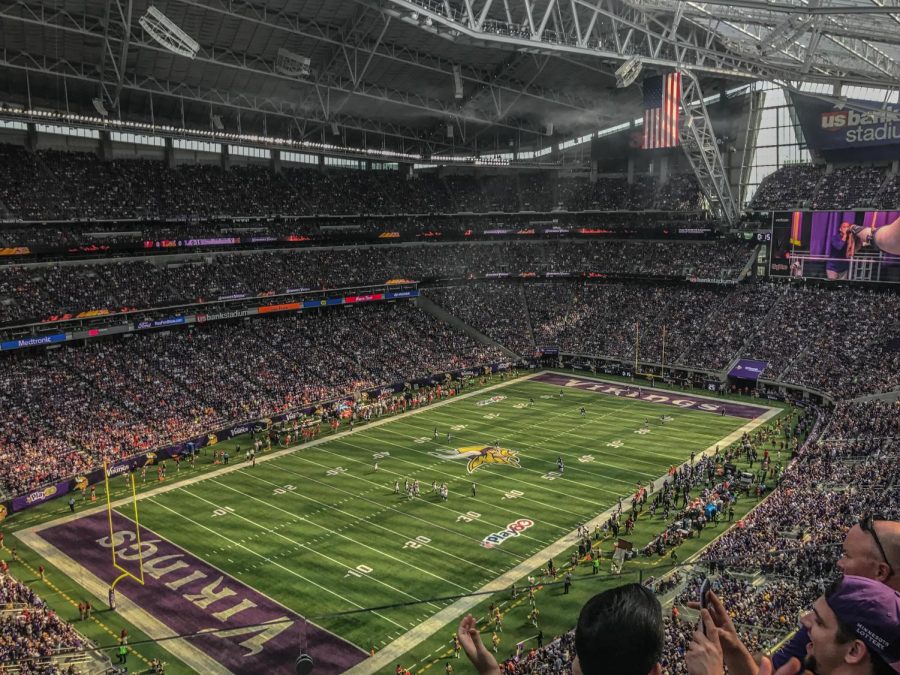Are Athletes Overpaid?
Professional Athletes Are Overpaid
Logan Selinski / Creative Commons
The US Bank Stadium was closed down December 2013 for renovations. Opened July 2016, the 3 year renovations cost $1.061 billion, half of which was paid by the state of Minnesota.
One cannot argue the importance of sports in American culture. Although it may not be this writer’s cup of tea, to deny the role that sports play on a societal scale, would be naive. Indeed, from college to professional, organized sports are often a large part of many people’s lives. However, one cannot help but wonder about the kind of money those within the professional leagues make.
The average NBA salary for the 2016-2017 season was $6.2 million, according to Forbes. The highest paid player, LeBron James, made $31 million for the season. Compare that to the highest doctor’s salary in the United States, which is at best $500 thousand a year, as reported by Forbes. Even the salary of the president of the United States is $400 thousand a year. Arguably, the stress of saving lives and running a country are far greater than playing professional sports.
A common argument is that the chances of playing professionally are so slim, between 0.03 percent and 0.09 percent, depending on the game, makes the sizable salary warranted. This is a valid argument, despite the chances of becoming president being much slimmer. But what does a salary of this magnitude mean for college players?
Unfortunately, college players are not paid, despite the amount of time and effort they put into their sport. Continuing with basketball as the example, in 2015, NCAA division 1 schools made about $100 million dollars in revenue, according to Bloomberg. While it’s worth noting, most of the money made is attributed to the top 23 percent of those schools, the high salary of professional athletes is often used as leverage over college athletes. This is despite only 1.2 percent of male college basketball players going on to play professionally, and 0.9 percent of female players, according to the NCAA.
Another great example of an underpaid but highly crucial profession is that of a United States soldier. An E1 serviceman, somebody who has just enlisted in the military with less than two years of experience, gets an annual salary of just over $19,000. Although, these soldiers are eligible for benefits, the amount of time dedicated to their service is disproportionate to their compensation. Nevertheless, both jobs require a lot of physical capability but at the end of the day, one gets to go home to their families and the other does not. Furthermore, soldiers spend about 90 hours a week in what is called ‘productive time,’ and are typically allotted 10 hours of free time a week. Think about a professional athlete. They, on the other hand, train about 36 hours a week. We can conclude that although both professions require physical endurance and time commitments, the pay gap is tremendously wide between the two. While an average soldier puts in more than twice the time of a sportsman, he also makes less than 1 percent of the average NBA player. It is evident that the obligations of one career far outweigh the other but the pay does not reflect any of it.
With the chance of earning millions on the horizon, it’s easy for college sports officials to rationalize a lack of compensation for their student athletes regardless of the fact that they make millions of dollars off of these athletes. While the free education that most university players are awarded is a nice start, the lofty checks professionals enjoy can serve as an unintentional roadblock to young players’ economic stability. So even if you don’t see a problem with a sportsmen’s multimillion dollar payday compared to that of a doctor, or a soldier, or even world leaders, you can recognize how these wages hurt their own.
Athletes work incredibly hard and should be awarded for their efforts, but it’s worth examining other careers, like those of medical professionals and soldiers, who are faced with far more complex tasks and aren’t rewarded nearly as handsomely. Although not everybody can be Kobe Bryant or Clayton Kershaw, not everybody can handle the horrors of combat or the stresses of surgery on a regular basis. Shouldn’t those less glamorous but far more essential professions be compensated as fairly?
Here is the link to an article that challenges this viewpoint.

